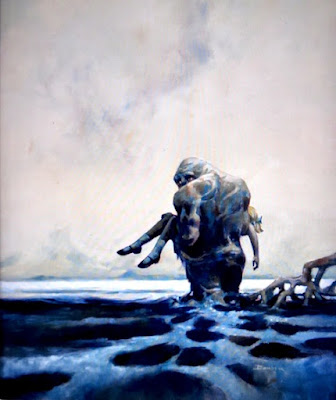A good idea? Or, should politics be avoided? Can it ever be avoided, when authors are humans and presumably possessed of some political bent, lightly or tightly held?
I think politics can be de-emphasized, and unless you’re setting out to write something like Gulliver’s Travels, think it usually should. Good writers show, not tell, which means showing life in all its richness and complexity, including the non-political sphere (it exists). But shorn of anything remotely considered political your writing runs the risk of being bland. Or becoming the Weird, otherworldly variety of Clark Ashton Smith’s wildest stories.
Getting political cuts both ways. For the liberal who’d like to see something closer to socialism implemented, punching up at corporate overlords through their fiction has understandable appeal. The bad guys can be Jeff Bezos or Elon Musk. But the perceived war on white men, capitalism, and the embrace of identity politics, has brought with it authorial counter-reaction from conservative authors.
Doing this type of work requires sophistication and a deft hand, or else it comes across as crass, activist screed. I don’t like reading painful, on the nose allegory. If you choose to write about the politics of the day, within a few years when the next leader is elected, you will find that your stories have aged, fast. Your clever references to political figures and hot-button issues will be rapidly outdated, obscure. Which is why I generally recommend either avoiding overt political messages, or better yet, focusing on reality—life as it actually exists, in all its forms, across the political spectrum and in the non-political sphere.
J.R.R. Tolkien was influenced by the events of his day, his Catholic upbringing, his World War I experiences (and World War II, despite his disavowal)—in addition to great swathes of non-political input including his deep knowledge of languages and medieval literature. But his stuff resists easy analysis. Is The Lord of the Rings conservative? In some respects, yes. A king is restored to his throne at the end. The Scouring of the Shire brushes up to outright critique of socialism. But the story is also about a multicultural fellowship who put aside their differences to beat a dictator. It reveres environmental preservation, critiquing the rapaciousness and industrial pollutions of Saruman. In other words, it depicts life in its richness and complexity. In so doing it presents glimpses of the truth, not a subjective political message of the day, which is one of the reasons why that work endures.
If you’re a writer, getting overtly political is one way to appeal to an audience, find your tribe, sell books. Certainly there is an appetite for all things political today. But it runs a risk. For example, in an anthology your tribe may discover other authors embrace views antithetical to its beliefs. The crudest example of this is the Flashing Swords #6 incident.
I keep going back to Howard for how to do this the right way (or at least the way I prefer my fiction). Are his Conan stories political? In a broad sense, yes. We can read Conan cutting through corrupt judges and monarchs as rebellion against the established order, a counterreaction to the injustices wrought by the Great Depression. But they are not direct critiques of Herbert Hoover (or maybe they are; if someone makes the case I’ll read that essay). They take a much broader, longer view of the course of human history, offering a dark view about the cyclical rise and fall of civilization and the imperfections in human nature, which makes them far more dangerous and memorable than mere of-the-day political commentary. It’s part of what has made Howard’s stories last. As has their non-political elements, like Howard’s incorporation of the literature of the west, and the Texas landscape.
I also think Leiber is instructive. Leiber’s critique of civilization was more subtle than Howard’s, his view of barbarians less romanticized (see “The Snow Women”). Rime Isle, the heroes’ end, was perhaps his statement on the need to break away from gods and cities, religion and politics. Perhaps old Fritz was on to something here, even though I found most of these latter stories wanting. Which maybe tells you something about our inability to ever flee reality.
I have said that my credo is literary freedom, and I stand by it. If getting overtly political in your fiction is what you want, it’s well within your rights, under the First Amendment. It should be this way.
If you want to write about a hero who rips down a wall built by a dictator, and opens the borders to a suffering neighboring community, you might be meet with cheers (from some). Others will boo your effort. How about a story about a barbarian who hacks his way through crime-plagued inner cities, solving violence with violence? Will you/should you accept that story?
Be prepared for criticism, both of the unfair/ugly variety from readers with axes to grind, but also of the thoughtful kind who see things from a different angle.
Life is lived in the middle. Political theory must meet reality. If you can live with that, have at it.









